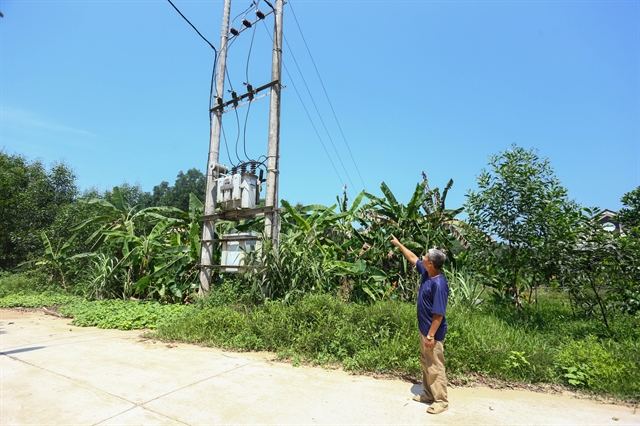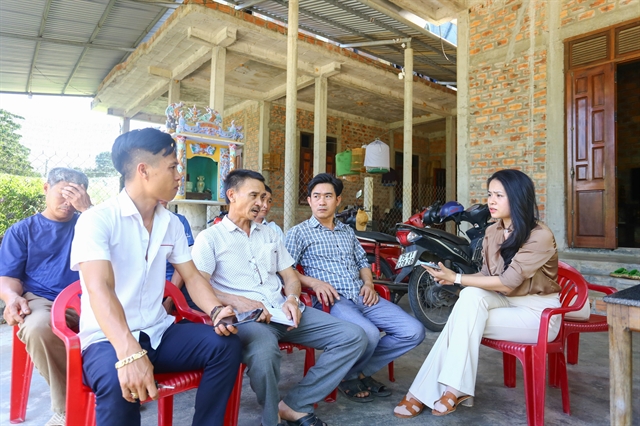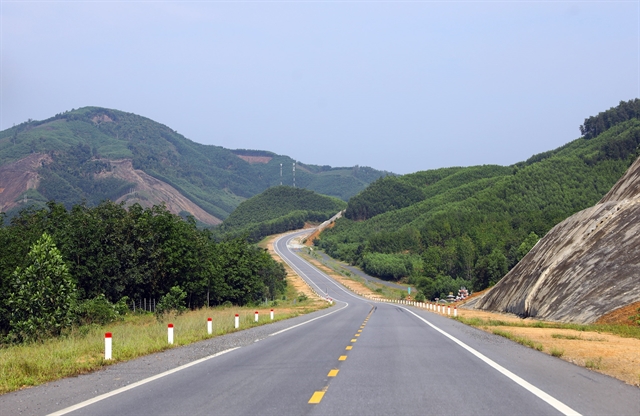 Society
Society

 |
| The 110kV substation is not supplied with electricity so people in Hưng An resettlement village have had to pull power lines from other places for use for many years. VNA/VNS Photo Mai Trang |
THỪA THIÊN-HUẾ — Households in Xuân Lộc Commune in Phú Lộc District are frustrated as they have had to use well water and live without electricity and certificates of land use rights for the past seven years at the new resettlement site.
In 2015, eight households in Xuân Mỹ Village of the commune gave up their land for an expressway project. They moved to a resettlement area in now Hưng An Village.
Four more households then lived in this resettlement area. However, five households who have built houses in this resettlement area have been living in poor conditions, Vietnam News Agency reported.
Lê Hữu Cường, a resident in the resettlement area, said people volunteered to dismantle their houses and give up land for the project so it could be completed on schedule, but the authorities failed to guarantee a stable life for people when they moved in.
In order to have electricity for daily life, families here had to use electricity lines from other places and used their own money to drill wells to pump water for common use.
Despite having built settlements for many years, no household in Hưng An Village has been granted a land use rights certificate.
They have worked with leaders of the People's Committees of districts and communes, but this issue has not been completely resolved.
Bùi Chính, another resident in the resettlement area, said that in 2016, when Đỗ Văn Mạnh, former officer of Phú Lộc District Land Fund Development Centre who was in charge of the project at that time, affirmed that if locals did not receive resettlement land, they would receive VNĐ45 million.
If the people received the land, that amount would be used to pay for the procedures to get a certificate of land use rights.
At the same time, locals would be allowed to owe a land use levy for five years and by the end of the five years, they could pay the levy and still receive a certificate of land use rights.
The information that Đỗ Văn Mạnh discussed and told local people was not officially documented.
In 2021, he was arrested and prosecuted for violating regulations on compensation, support and resettlement under Article 230 of the 2015 Penal Code.
When Chính delayed the payment of the levy and went to the tax office to fulfil his obligations after the five-year term, he was informed that he owed late payment interest of VNĐ27 million.
Other residents including Phạm Tấn Quang also owed VNĐ30 million of late payment interest, which is a huge amount for them.
 |
| Local residents said they have struggled with new life in the resettlement area. VNA/VNS Photo Mai Trang |
According to Vice Chairman of Phú Lộc District People's Committee Hoàng Văn Đề, the authorities have organised meetings and discussed these issues many times with the leaders of Xuân Lộc Commune.
To solve electricity and water problems, he said, the commune authorities must submit a medium-term and annual (demand) plan, then the district will review, approve and allocate capital for the area.
“Due to a very small number of households, the amount of infrastructure investment (allocated) is very small,” he said.
"If it’s several dozen or a few hundred households, it would be easier to solve the problem," he said.
According to Director of the district’s Land Fund Development Centre Trần Viết Tú the resettlement area is planned to cover 5 ha, with investment in infrastructure and essential items such as concrete roads, electric substations, water supply and drainage systems.
However, the electricity agency said that supplying electricity to a 110kV transformer substation to serve the needs of a few households in the resettlement area would result in a relatively large loss of electricity. Therefore, the substation is not supplied with electricity and people have had to pull power lines from other places for use for many years.
Regarding the issuance of the land use rights certificates, Trần Viết Tú has acknowledged that there are regulations for the debt of land use fees within 5 years for those in difficult situations in the resettlement area. It is approved when locals make a request and get confirmation from the district People's Committee.
 |
| The La Sơn-Tuý Loan expressway stretches more than 77km. VNA/VNS Photo Đỗ Trưởng |
However, local households did not make a request, and so far, they are not eligible to be considered for a loan for land use.
Currently, the district authorities are reviewing households that are eligible to be granted land use rights certificates.
For cases that have not yet been granted a land use rights certificate but have already built a house, the district would not recover the land and would guide them to carry out the procedures to be granted a certificate.
In May 2023, authorities will give explanations and answers to the people about the above issues.
The La Sơn-Tuý Loan expressway, stretching more than 77km, has the first point at La Sơn junction (Lộc Sơn Commune, Phú Lộc District, Thừa Thiên Huế) and the ending point in Túy Loan (Hoà Vang District, Đà Nẵng City), of which more than 11km runs through Bạch Mã National Park. The project has a total investment of VNĐ11.5 trillion (US$500 million).
The highway is expected to help connect with the already operating Đà Nẵng-Quảng Ngãi Expressway, creating smooth traffic linkage from Huế to Đà Nẵng and key projects of Đà Nẵng such as the Hi-Tech Park, the Information Technology Park, the newly-planned Liên Chiểu seaport, the Kim Liên railway cargo station, and the East-West Economic Corridor. — VNS




